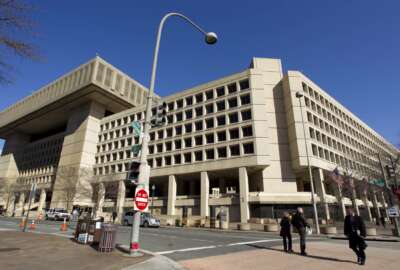

The General Services Administration and its inspector general are at odds with each other following the release of a strongly worded IG report Monday about the fate...
Best listening experience is on Chrome, Firefox or Safari. Subscribe to Federal Drive’s daily audio interviews on Apple Podcasts or PodcastOne.
The General Services Administration and its inspector general are at odds with each other following the release of a strongly worded IG report Monday about the fate of the FBI headquarters.
The long-awaited IG report claims Administrator Emily Murphy omitted key details in her testimony to Congress about the White House’s involvement in the decision to keep the FBI’s headquarters in Washington, D.C.
“We found that Murphy’s congressional testimony was incomplete and may have left the misleading impression that she had no discussions with White House officials in the decision-making
process about the project,” auditors wrote.
But in response to a draft version of the report, GSA said the IG found Murphy’s testimony to be truthful, and auditors left out key meetings and discussions dating back to the fall of 2017 about the direction of the FBI headquarters.
“The draft report includes wide-ranging speculative allegations regarding that testimony, which serve as an unnecessary distraction to the report’s stated purpose of reviewing GSA’s decision-making process on the revised FBI headquarters project plans,” GSA’s response states.
At the heart of the issue is the role the White House played in the decision, and the politics underpinning the change in approach for the FBI headquarters.
Murphy told the IG’s office that she and her team anticipated questions from members of the House Appropriations Committee in April 2018 about the Trump administration’s role in the FBI headquarters decision.
During the hearing, Rep. Mike Quigley (D-Ill.) asked Murphy: “To your knowledge, was the president or anyone else at the White House involved in those discussions, either with your predecessors, people you’re working with now, or yourself?”
“It was the FBI that directed GSA as to what its requirements would be,” Murphy said. “We obviously did, given that it is a substantial budget request, we coordinated that request with OMB to provide for funding, but the requirements were generated by the FBI.”
Murphy told the IG that she didn’t give lawmakers the response she had prepared — that it was “inappropriate to comment” about White House meetings that did or did not happen — because she thought that response would “derail” the hearing.
According to GSA, the FBI — not the White House — served as the impetus for keeping its headquarters in D.C. In November 2017, shortly after Chris Wray took over as director, GSA said FBI officials signaled their support for keeping its headquarters in D.C.
“It became clear to GSA that the FBI was seriously considering the Pennsylvania Avenue site, at the direction of FBI’s senior leadership,” the agency wrote.
Murphy told the IG that both Wray and Deputy Attorney General Rod Rosenstein had made it clear proximity to the Justice Department was important to the FBI.
Pam Dixon, a GSA spokeswoman, said in a statement that the agency stands by Murphy’s testimony to lawmakers.
“The IG review acknowledges an indisputable fact: the administrator’s congressional testimony was truthful. As the FBI’s representative stated under oath before the Senate Committee on Environment and Public Works, the FBI made the decision to keep its headquarters on Pennsylvania Avenue. GSA is unaware of any White House involvement in the FBI’s decision,” Dixon said.
But auditors said Murphy left out details during her testimony about her meetings with the White House. She attended three meetings with White House officials about the FBI’s new headquarters prior to the April 2018 hearing, but agency officials advised her not to provide details about those meetings, even in follow-up questions from lawmakers.
“She stated that the participants in the preparatory sessions agreed that she should try to answer the substance of the question without specifically addressing the White House meetings. If pressed, she would answer that ‘it would be inappropriate to comment on any discussions I had or did not have with the president.'” the IG report stated.
When asked by the IG for information about her meetings with President Donald Trump and senior White House officials, including Chief of Staff John Kelly and Office of Management and Budget Director Mick Mulvaney, her private counsel told the IG’s office that Murphy was not authorized to discuss “specific communications with the president.”
The White House, though, did not assert executive privilege regarding those hearings.
“However, she was authorized to disclose the existence of White House meetings, attendees at the meetings, the topics of meetings with the president, and the outcomes of the meetings with the president,” the IG report said.
However, in GSA’s review of the draft IG report, Robert Borden, the agency’s chief of staff, said it had “questions and significant concerns” about the conduct of the IG’s staff during the interview process.
“Senior GSA officials promptly made themselves available to be interviewed, sometimes twice, to assist with your office’s review, but many GSA officials left their interviews feeling the conduct of your office was inappropriate, outside of normal business practice, deceptive and, at times, hostile,” Borden wrote.
GSA claims that in a number of interviews, IG staff focused “almost exclusively” on what had been discussed at the White House meeting.
During those interviews, GSA officials told the IG’s office that they were not authorized to discuss presidential communications.
“We understand that your office may take a different view as to your authority to compel disclosure of all information, but it was disappointing that your staff chose, during those interviews, to employ bullying tactics that appeared intended to threaten, intimidate and coerce GSA officials into divulging those communications directly,” Borden writes.
GSA said its general counsel and the IG’s legal team reached “a clear agreement” not to ask questions about specific presidential communications in follow-up interviews. However, Borden claims the IG’s office “disregarded that agreement and asked pointed questions about communications that were explicitly out of bounds.”
“GSA will continue to diligently engage and support your office’s reviews of GSA program and operations. Going forward, GSA asks that you help ensure the conduct of future IG interviews be more respectful and collegial,” Borden wrote.
After reviewing a draft of the IG report, Murphy requested that the IG’s office remove all discussion of her congressional testimony from the IG’s report.
“Murphy asserted that our conclusion is unfounded and unfair because the congressman’s questions were ‘clearly limited’ to the decision to maintain the location of the FBI headquarters at its present site. We disagree and believe the congressman’s questions speak for themselves, as do Murphy’s answers at the hearing. Murphy’s answers went well beyond the decision not to build a suburban FBI facility,” the IG report states.
In a follow-up request, Murphy had also asked the IG to delete its findings about her congressional testimony and replace it with language that she provided. However, the IG also declined that request.
“Under these circumstances, we cannot ignore Murphy’s failure to disclose that she had discussed those very issues with the president and others at the White House,” the report said.
Brian Miller, a former GSA inspector general and a shareholder in the D.C. office of the law firm Rogers Joseph O’Donnell, has been retained to offer an expert statement on Murphy’s behalf in the IG’s review of this issue.
In an interview with Federal News Radio, Miller said that the report’s focus on Murphy’s congressional testimony goes beyond the normal scope of an IG’s authority.
“When it’s talking about the cost of the FBI building, that’s all pretty traditional of an IG function. When the report adds in a section on the testimony of the administrator, that’s where I think it may be going beyond the facts,” Miller said.
In regard to her omission about White House meetings, Miller said Murphy answered lawmakers’ questions fully and truthfully, and didn’t need to volunteer that information.
“As I understand the facts, the FBI made the decision to keep the headquarters where it is. That’s what was at the heart of the question, and that’s what the administrator testified to. She doesn’t have an obligation to answer follow-up questions that were not asked,” he said.
The IG also found that GSA’s latest plan to demolish and rebuild on the site of the J. Edgar Hoover building would cost more than the cash-and-land deal the agency had pursued for more than a decade.
Under that deal, GSA would have awarded the J. Edgar Hoover site to a developer as part of the payment for constructing a new suburban FBI headquarters. GSA had also planned to relocate the FBI suburban headquarters to Springfield, Virginia; Landover, Maryland; or Greenbelt, Maryland.
The administration’s most recent plan asks for $3.3 billion to demolish the J. Edgar Hoover building and construct a new headquarters in its place. Accounting for previously appropriated funds, the GSA IG found the administration needs about $2 billion to move forward with the project.
While GSA promoted the demolish-and-rebuild plan as a less costly alternative to moving the FBI out of D.C., the estimate did not include the costs of relocating more than 2,300 FBI employees to agency facilities in Alabama, Idaho, Virginia and West Virginia.
“The revised FBI headquarters plan does not accurately portray the costs and shortfall comparison
between the previously canceled J. Edgar Hoover (JEH) exchange and the JEH rebuild,” the IG report said.
The FBI projects relocation and non-construction costs for the J. Edgar Hoover sites would cost about $516 million. Of that total, $57 million would go toward employee relocation expenses.
The majority of relocated FBI employees, about 1,800, would move to Huntsville, Alabama. About 250-300 employees would move to the Pocatello, Idaho facility and another 150-200 would move to a site in Clarksburg, West Virginia.
During the course of its report, GSA OIG reviewed more than 50,000 agency documents and emails and interviewed 20 key officials, including Murphy, Public Buildings Service Commissioner Dan Mathews and GSA acting General Counsel Jack St. John.
GSA’s Dixon also told Federal News Radio that the agency stands by its cost analysis for its revised headquarters plan, adding those numbers are “accurate, transparent, and more representative of the full costs of the project than the analysis put forth in the IG review.”
Rep. Gerry Connolly (D-Va.) first requested the IG review in February. In a statement Monday, he said the IG report “substantiates my concerns on all counts,” and urged the House Oversight and Government Reform Committee to convene “immediate hearings” on the report’s findings.
“This IG report is only the beginning. We must develop a comprehensive understanding of the president’s involvement in this procurement and what it has cost the United States in terms of both national security and taxpayer dollars,” Connolly said.
In a tweet Monday, Sen. Chris Van Hollen (D-Md.), a vocal opponent of keeping the FBI headquarters in D.C., applauded the IG’s report.
“Despite efforts by the administration to dodge the truth, GSA OIG sent us a report confirming that Trump was in previously undisclosed meetings about the relocation of the FBI HQ,” Van Hollen wrote. “And despite telling Congress the plan changed to save money, the numbers don’t add up.”
Copyright © 2025 Federal News Network. All rights reserved. This website is not intended for users located within the European Economic Area.
Jory Heckman is a reporter at Federal News Network covering U.S. Postal Service, IRS, big data and technology issues.
Follow @jheckmanWFED


